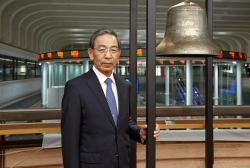
As we welcome the New Year, I would like to offer my warmest greetings and wish everyone health and prosperity in 2016.
Looking back, the stock market started off 2015 in bullish conditions thanks to favorable corporate business performance and a weakened yen. In April, the Nikkei Stock Average recovered JPY 20,000 levels for the first time in nearly 15 years. After the summer, we witnessed temporary but large corrections due to concerns over a slowdown in the Chinese economy and uncertainty in emerging economies as a result of falling oil prices. On the whole, however, the market remained firm throughout the year.
In August, market capitalization for the TSE 1st Section marked a record high of JPY 609 trillion, exceeding the value seen on December 29, 1989 at the peak of the bubble economy. This is attributable to not only aggressive initiatives to enhance corporate value under Abenomics, but also to ceaseless management efforts by all listed companies.
Last June, TSE implemented Japan's Corporate Governance Code in collaboration with the Financial Services Agency. The Code attracted tremendous attention as a historic milestone for the management of listed companies. In dialogues with domestic and foreign institutional investors, I myself have felt that there are growing expectations for and understanding of the huge revolutionary changes in the corporate governance regime at Japanese companies.
The comply-or-explain approach of the Code is a relatively novel concept for us, and it requires companies to comply with 73 principles or, if they cannot comply, to explain their reasons for non-compliance. The Code calls for corporate managers to appoint more than one independent director and foster constructive dialogue with investors. Thus, through strengthened corporate governance, the Code aims to help listed companies to achieve sustainable growth in corporate value.
In terms of market discipline, President Sato of Japan Exchange Regulation and I, then president of TSE, made a joint petition last March to the Japan Securities Dealers Association (JADA) and the Japanese Institute of Certified Public Accountants (JICPA) for cooperation on measures to address issues with IPOs. Thereafter, JADA, JICPA, and the JPX group have worked together to maintain confidence in the market and taken measures to strengthen underwriting examinations administered by lead managing underwriters, accounting audits conducted by audit firms, and listing examinations carried out by TSE.
In 2009, the number of IPOs dropped to 19 in the wake of the Lehman shock. Thereafter, however, IPOs have been on a steady rise due to market participants' persistent efforts. Last year, 98 companies went public nationwide, and, in November, we welcomed the large-scale listings of the three Japan Post (JP) companies. With the arrival of a new year, we renew our commitment to attract companies for new listings, together with market participants, while ensuring we continue our efforts to maintain market discipline.
Last September, TSE renewed arrowhead, our core trading infrastructure for cash equities, for the first time after its launch five years ago. The renewed arrowhead puts more emphasis on market reliability and stability than on speed. The system has demonstrated stable performance, even at the time of the JP triple-listing last November and during times of high market volatility, gaining high praise from market participants.
This year, OSE will be renewing J-GATE, its derivatives trading system. This will enhance system reliability and capabilities, thereby facilitating the launch of new products in a more speedy manner and further improving system stability. We will spare no effort to lead this project of launching the next J-GATE to completion.
As for cross-border initiatives, Yangon Stock Exchange (YSX) was established in Myanmar last year. We are greatly pleased with the successful launch of YSX, as we devoted nearly four years to assisting with the establishment of a stock exchange in the country. We very much look forward to seeing prospective listed companies complete their listing examinations and to the start of trading at YSX in the near future.
We have successfully completed our market reorganization and system integration with "cash equities under TSE and derivatives under OSE" and are entering our fourth year as a corporate group today. The first medium-term management plan established promptly after our foundation will come to an end this March, and we are currently moving to formulate a new medium-term management plan. Given that our external environment is vastly different from when the current plan was formulated, the new plan will naturally reflect these changes.
Take the term "FinTech", as an example. FinTech is short for financial technology, and just three years ago you would rarely hear this word come up. However, FinTech has now become an unavoidable theme when formulating management strategies. As securities industry have seen IT bring about revolutionary changes in the form of online trading, algorithm trading, HFT, and co-location trading, I think that FinTech has the potential to dramatically change the quality of financial services, changing the conventional notion of IT.
Needless to say, however, we have to direct meticulous attention to stability, credibility, and other matters that are imperative in the financial system. In that respect, I believe that FinTech can lead to financial services that will create the most value for users.
Finally, all of us at JPX would like to express our sincere gratitude for your warm support in the last year. Your continued cooperation and guidance will be much appreciated as we move forward.
January 4, 2016
Akira Kiyota
Director & Representative Executive Officer, Group CEO
Japan Exchange Group, Inc.




